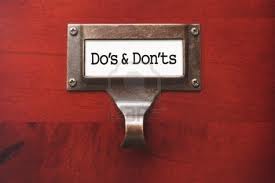When it comes to leaving your job, however tempting the two-finger salute, or the verbal equivalent may be, you should never let your emotions get the better of you. ‘Don’t wait until you’re hopping mad to resign. Do it while you’re strong. And never express your anger to your boss, bide your time and keep it professional,’ advises occupational psychologist Colin Selby.

You may have landed the job of your dreams, but you never know when your career may bring you into contact with your former employers again. For instance, at some point they could be a potential client.
Do:
- Tell your immediate boss informally, face-to-face, before handing in a formal letter.
- Give constructive criticism if necessary but avoid blatant insults.
- Be prepared to consider a counter offer from your employer.
- Do as much as you can to facilitate a smooth handover.
- Remember that the people you were working with could be good contacts for the future.
- Choose your referees carefully and brief them on why you think you are suitable for your next job.
Don’t:
- Hand in your notice when you are feeling angry.
- Focus solely on negative points.
- Feel obliged to give specific reasons for your resignation.
What if my employer tries to tempt me to stay?
If you are offered a pay rise equal to or above your new job offer, consider why it took the threat of leaving to bring it about.
Your boss may promise to remedy any problems within the company which have influenced your decision, but can you be sure they will be dealt with effectively?
If you do decide to stay after all, remember that your boss may see you as ‘the one who nearly left’ and you may find yourself having to prove your commitment to the organisation.
By staying, you will in turn have to turn down a job you have accepted – this will could work against you if you deal with your would-be employer in the future.
What should I say in my letter of resignation?
Your letter is a vital part of your resignation, but should not be used to air your grievances. Says Selby: ‘Hold fire before saying something you might regret. Write your letter and then sleep on it and return to it in the morning. You can then re-write with a clear head.’
The letter needs to include only the basic details of your resignation – the position from which you are resigning and your intended leaving date.
If you wish to add more, keep it positive and resist the temptation to get personal. If you haven’t had the chance to sit down with your employer, you could include constructive criticism in your letter to explain your reasons for leaving, but it may be worth asking a respected colleague to read over it first.
What about my notice period?
Your notice period is usually stated in your contract of employment. Where no period of notice is stipulated, you should allow between two weeks to a month.
Normally you have to work your notice period, in which time you can handover your duties and responsibilities to someone else. However, sometimes there will be reasons why you or your boss will want to make the notice period shorter.
‘If you want to exit more quickly, try to offer solutions to any barriers that could prevent you. For example, draw up a schedule of work that ensures any essential projects are completed,’ says Jeff Grout, author of Kickstart Your Career.
You may need to include a waiver of your notice period in your resignation letter. For example, if your contract calls for you to work a month’s notice, but your new employer wants you to start straight away, include a paragraph stating:
‘I am aware that my contract demands a notice period of (x) months, but I am required to join my new employer as soon as possible. If you could therefore waive my notice period, I would be happy to help hand over responsibilities to my replacement.’
Should I leave before I have another job?
It may seem like suicide to leave the security of a regular income when there are mortgage payments, school fees and other bills chaining you to your cheque book. But your reasons for resigning may mean you’ve had enough of working for a while, or your determination to leave may be so strong, you’ll go no matter what.
A survey by I-resign.com showed 49 per cent of respondents didn’t have a job to go to after resigning. While it may not be the most sensible idea financially, whether you want to make a complete career change, become a student or just take a holiday, taking a break from work may help you assess why you were unhappy with your job in the first place.
However, the flip-side is that employers may be more inclined to hire those already in employment.


